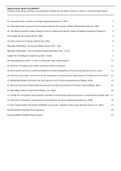Digital Business Models (6013B0504Y)
Summary of all articles and videos covered by Ross Gardner for the midterm exam (i.e. articles 1-15 and the three videos)
01. Consumer Power: Evolution in the Digital Age (Labrecque et al., 2013) 2
02. Antecedents and consequences of e-business adoption for European retailers (Bordonaba-Juste et al., 2012) 3
03. The wheel of business model reinvention: How to reshape your business model to leapfrog competitors (Voelpel et … 4
04. Strategy and the Internet (Porter, 2001) 5
05. Value creation in E-business (Amit & Zott, 2001) 6
Alexander Osterwalder: The Business Model Canvas (0:00 – 3:33) 7
Alexander Osterwalder: Tools for Business Model Generation (0:00 – 30:15) 8
Joseph Pine: Profiting from Experiences (0:00 – 28:23) 9
06. Brand experience what is it? How is it measured? Does it affect loyalty? 10
07. Elements of strategic social media marketing: A holistic framework 11
08. Social media? Get serious! Understanding the functional building blocks of social media (Kietzmann et al., 2011) 12
09. Consumer trust in B2C e-Commerce and the importance of social presence: experiments in e-Products and e-Services (… 13
10. Marketing strategies, perceived risks, and consumer trust in online buying behaviour (Pappas, 2016) 14
11. Word of mouth and interpersonal communication: A review and directions for future research (Berger, 2014) 15
12. What Makes Online Content Viral? (Berger et al., 2014) 16
13. The Big Five, self-esteem, and narcissism as predictors of the topics people write about in Facebook status updates (Mar… 17
14. Influencers on Instagram: Antecedents and consequences of opinion leadership (Casaló et al., 2018) 18
15. Does Twitter matter? The impact of MWOM on consumers’ adoption of new movies (Hennig-Thurau et al., 2015) 19
Example Midterm Multiple Choice Questions 20
Example Midterm Multiple Choice Answers 21
, 01. Consumer Power: Evolution in the Digital Age (Labrecque et al., 2013)
• This article explores the intersection of consumer behaviour and digital media by defining consumer power and
empowerment in Internet and social media contexts and by presenting a theoretical framework of four distinct
consumer power sources: demand-, information-, network-, and crowd-based power.
• Power refers to the asymmetric ability to control people or valued resources in online social relations.
o In online worlds, if no counterpart existed, power could not arise.
▪ A powerful entity requires a comparison with a powerless one to derive its position, through
perceptions of control over comparatively more people or resources.
▪ The powerless entity tacitly accepts the differences in the online hierarchy, because it controls
comparatively fewer people or resources, and approves the claim on power by the powerful entity.
• Influence is a function of reach, the degree of the person's embeddedness in the social network, and persuasiveness,
linked to the relevance of the content the person creates online.
o To be influential, a social media participant needs relevant content and sufficient reach.
• Control over valuable resources refers to the right to dispose of tangible or nontangible assets online.
o In virtual communities, status constitutes a scarce resource, derived from longevity, expertise, or the network
governance roles assumed by particularly engaged contributors and signified by hierarchically organised icons.
• Empowerment refers to the dynamic process of gaining power through action by changing the status quo in current
power balances.
• Demand-based Power → individual-based power sources
o Resides in the aggregated impact of consumption and purchase behaviours arising out of Internet and social
media technologies.
o Technical/Historical
▪ Expanded assortments through efficient distribution and warehousing.
▪ Search engines and graphical browsers allowed increased consumer access and choice, yet the
knowledge, financial, and infrastructure barriers at this time limited an individual’s ability to create
personal websites and share information.
• Information-based Power → individual-based power sources
o Comprised of two facets, grounded in the abilities to consume and produce content:
▪ Information-based power through content consumption relates to the ease of access to product or
service information, which reduces information asymmetry, expedites market diffusion of
information and shortens product lifecycles.
▪ Information-based power through content production is the ability to produce user-generated-
content; it enables empowerment by providing an outlet for self-expression, extending individual
reach, and elevating the potential for individual opinion to influence markets.
o Technical/Historical
▪ Increased Internet access allows consumers access to both marketer and consumer content and
creates a stage for self-expression.
▪ Web 2.0 applications broaden both information access and the ability to produce content through
simple code-free interfaces.
▪ The eradication technical barriers of the Web 1.0 era coupled with the free or low cost hosting for
individual profiles and accounts across digital media platforms enabled average consumers to easily
consume content and create multiple presences across the Internet.
• Network-based Power → network-based power sources
o Centres on the metamorphosis of content through network actions designed to build personal reputation and
influence markets through the distribution, remixing, and enhancement of digital content.
o This power speaks to the actions by which others can add value, beyond that of the original content.
o This value derives from activities such as content dissemination (e.g., sharing and organizing content through
networks), content completion (e.g., comments on a blogpost that contribute to previous content, tagging), or
content modifications (e.g., repurposing content, such as a video or image meme) in social networks.
o Technical/Historical
▪ The rise of the importance of social networks allow increased distribution of content, along with a
greater ability for repurposing content and reputation building.
• Crowd-based Power → network-based power sources
o Resides in the ability to pool, mobilise, and structure resources in ways that benefit individuals and groups.
o E.g. crowd-creation (Wikipedia, SoundCloud), crowdfunding (Kickstarter, Indiegogo), crowd-sourcing (Amazon
Mechanical Turk), crowd-selling (Etsy), or crowd-support in peer-to-peer problem solving (P3) communities.
o Technical/Historical
▪ Advances in mobile technology and data infrastructure allow for ubiquitous and nearly instant access
to information and resources across digital platforms.
▪ Crowd-based power allows for the rise of group/community buying power, crowdsourcing, and
crowdfunding, the sharing economy, and the creation of new marketplaces.





